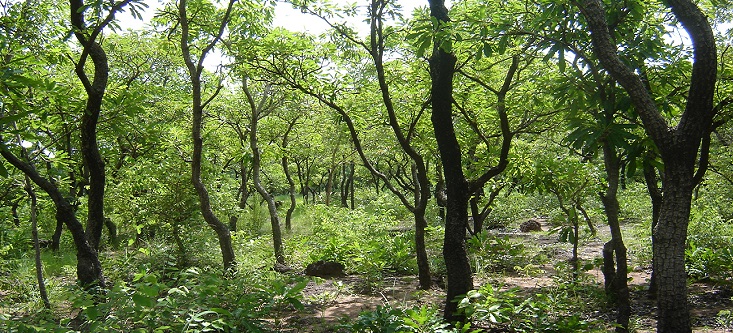By Byron Mutingwende
Forests play a pivotal role in the lives of both plants and animals, experts told members of the community in the three of the 11 wards in Mbire District in which Transparency International Zimbabwe (TIZ) is providing awareness training on Reducing Emissions from Deforestation and Forestry Degradation (REDD+) programme.
TIZ, through its climate finance integrity programme funded by the European Union, is monitoring the implementation of the Kariba REDD+ project run by Carbon Green Africa in the three districts of Mbire, Muzarabani and Kariba.
Speaking at a TIZ community sensitisation meeting held at Monozi Primary School in Mbire on Tuesday, 13 September 2013, Ward 16 Councillor for the area, Louis Nyamushamba said that the REDD+ project had brought about immense benefits not only to the parents but the students in the schools as well.
“I am inspired by Mr. Darlington Dhorobha, the headmaster of Monozi Secondary School for reiterating the fact that forests are not only important for providing firewood, furniture, medicines and feeding for livestock.
“The teachers use the forests to teach about photosynthesis and the water cycle. Students would understand better through the practical lessons. With the teachings from Mr. Hamunakwadi and Mr. Mutingwende from Transparency International Zimbabwe, we now understand that trees help in increasing rainfall for planting plants and reducing global warming,” Nyamushamba said.
He added that community lectures helped villagers to understand the essence of having trees to provide them with oxygen and some of the uses outlined earlier.
The Executive Environmental Officer of Mbire Rural District Council, Cassius Nyahuni urged the members of the local community to guard against deforestation and poaching.
“Trees act as carbon sinks. Working with Carbon Green Africa, we have marked some mopani trees in the forests that must be spared at all times. We discourage veld fires and encourage the use of axes in fetching firewood.
“Our REDD+ investor has the obligation to provide the communities with 30% of their total earnings from the sale of carbon credits. Most of the projects that we encourage them to do is to sink new and repair existing boreholes and embark on non-carbon benefit activities like bee-keeping and conservation agriculture,” Mahuni said.
The REDD+ project came after industrialised countries admitted to emitting destructive substances to the ozone layer from their factories and the realisation that some developing countries were also emitting through some veld fires and deforestation. Those looking after huge forests would then be rewarded with carbon credits for keeping trees that act as carbon sinks.
The investor that we want: community
After learning about safeguards which are measures or policies that guard against undue harm from investment or development activities community members were capacitated to air their expectations from Carbon Green Africa.
“Safeguards related to REDD+ within UNFCCC COP decisions aim to prevent REDD+ activities from causing harm to diversity and people, and also help REDD+ realise multiple benefits, beyond simply emission reduction. Therefore, as signatory of the UNFCCC, Zimbabwe should prioritise the protection of individual rights of those potentially affected by a REDD+ initiative,” said Danai Mabuto, a TIZ official.
Mabuto said that safeguards that require respecting land tenure rights of local communities will not only improve the success of REDD+ implementation, but could also deliver significant economic benefits.
“Tenure security will help to engage and include communities in the design, implementation and monitoring of REDD+ projects, minimising the risk of future land disputes and reducing the risk to investors engaging in REDD+ initiatives. Adequate safeguards will ensure that the implementation of REDD+ can contribute to other national priorities such as poverty reduction and sustainable development.
“There is also the need to consider how the local community relates to the forest as well as an understanding of their social cohesion. This should include assessing their conflict resolution and management frameworks.”
In Mbire District, there are conflicts between the human beings and wildlife – calling for the necessity of coming up with measures to mitigate them.
In Wards 1, 2 and 16 under Mbire Rural District Council, elephants were blamed for destroying villagers’ crops and killing people when enraged.
“In Ward 2, a breadwinner was killed by an elephant. The matter was reported to council and the Parks and Wildlife Management Authority. Unlike when a matter of poaching is reported it took the authorities more days to come and investigate the matter. Besides, council and the parks people only chipped in with a paltry $30 to assist at the funeral and the assistance ended there. It seems since there is a price tag for ivory, elephants are now more important that the people,” complained a community member who refused to be named.
Dereck Hamunakwadi, a researcher at TIZ said that existing land tenure systems should be assessed to guard against fuelling conflicts.
He added that there was the need to consider safeguards around gender if there is a likelihood that the project will have adverse impacts on gender equality or women’s ability to access and use resources. The rights of the minority and indigenous groups should also be protected.
In certain instances people have a relationship with the forests for medicine and so forth. Another environmental consideration for safeguards is on protecting rivers and dams against alien or endangered species.
It also emerged that consideration should be given to existing economic enterprises like curios business and coal mining. The projects should not increase illegal activities like poaching and logging.
As recommendation, TIZ said that REDD+ projects should be focused on how to address poverty, marginalisation, vulnerability and on how to increase food security and ensure biodiversity conservation.
